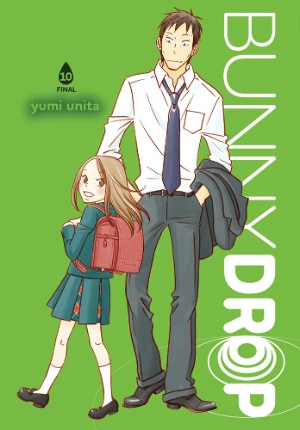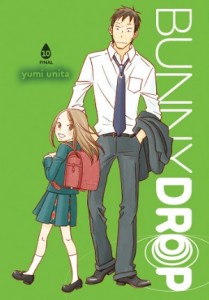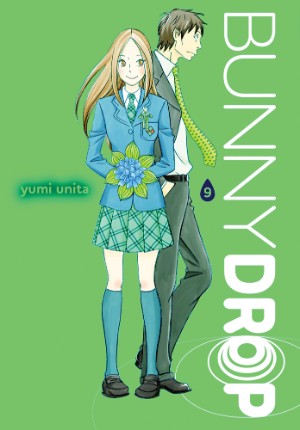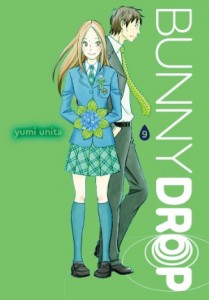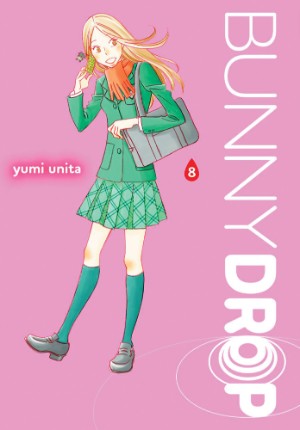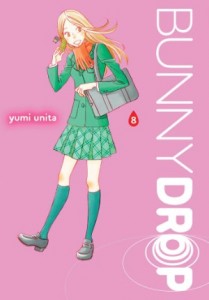By Yumi Unita. Released in Japan as “Usagi Drop” by Shodensha, serialized in the magazine Feel Young. Released in North America by Yen Press.
Yen Press very helpfully published an interview with Yumi Unita at the end of this final volume of Bunny Drop. In it she states that she had planned what happened in Bunny Drop from the start, and that she wanted to contrast it with the manga she was writing for rival publisher Takeshobo, Yoningurashi. A quick Google search led me to learn that Yoningurashi, aka The Four of Us, was a series about a couple raising two young children. And suddenly a lot of what happened in Bunny Drop makes more sense. Or more accurately, what didn’t happen.
See, I had expectations when I started reading Bunny Drop, before *those* spoilers came out. I expected what we got for the first four volumes, aka Daikichi’s learning how to be a parent and raising Rin in adorably heartwarming ways. But I also expected that he’d end up hooking up with Kouki’s mother, and that they’d raise Rin and Kouski as a family. Sure, I expected Rin and Kouki to hook up later in life, but honestly, I’ve been reading about ‘but we’re not really siblings’ love since the days of Marmalade Boy, so it didn’t really bother me.
Of course, we did not get that. Instead, Unita contrasted Bunny Drop with her other series by subverting every expectation we had. And I’ve got to hand it to her, it certainly worked, though in the end I’m still left with a feeling of massive frustration. This is not helped by the stories in this last volume, which go back and fill in some blanks from earlier in Rin’s life. We see heartwarming and amusing parenting as Daikichi tries to explain ‘why we don’t always kill bugs’ to young Rin. We get a tortuous ship teasing scene between Daikichi and Kouki’s mother after Kouki gets in an accident and Daikichi has to take care of things, where by the end you are screaming at the two of them to just kiss already. (Spoilers: they don’t.) We get some backstory explaining how Rin’s mother ended up with her manga assistant/lover, and how Kouki fell into delinquency (and then out of it) in middle school. Honestly, they’re all well-written and pretty fun.
And then we get a final story showing Rin and Daikichi, who have now been a couple for several months. And really, seriously, nothing has changed. I approve of Unita not showing us their sex life, but honestly without that you’re left wondering why any of this happened at all. (Things are not helped by adding a girl who not only Kouki but also the reader had forgotten, and seeing about hooking him up with her at the VERY last minute.) Unita noted that she tried to avoid Rin’s inner monologue in the ‘pre-timeskip’ period, and avoid Daikichi’s afterwards, but honestly all this has done is made us wonder about how any of this came about, particularly with Daikichi, whose love for Rin and desire to let her do this seems to come down to ‘well, OK, I guess.’
So in the end I liked individual parts of this story, but am very dissatisfied with how it came together as a whole. Particularly as there was a story that was being made really obvious and heartwarming that wasn’t told here. Now, part of that may be me as a reader projecting out on what wasn’t really intended, but given the general negative reception Bunny Drop has had post-timeskip, I don’t really think it’s just me. I’d suggest someone write some fixfics, but I’m not sure the series has enough of a fandom. In the end, Bunny Drop was an interesting, fascinating, and uniquely annoying series that amazingly I still think is worth reading anyway, provided your dentist doesn’t mind the loss of enamel you’ll have from grinding your teeth.
